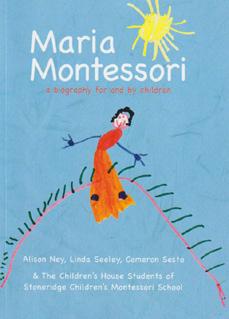
3 minute read
Attributes of Montessori Children
by Cathie Perolman
DEAR CATHIE—
IS THERE REALLY A DIFFERENCE BETWEEN CHILDREN WHO HAVE ATTENDED A MONTESSORI SCHOOL AND THOSE WHO ATTEND OTHER SCHOOLS? DOES THE SCHOOL, ESPECIALLY THE PRESCHOOL, ONE ATTENDS REALLY MATTER THAT MUCH?
— A PONDERING PAPA
Dear Papa,
This is a question that has plagued parents for many decades. And yet generation after generation of parents tour schools looking for the best fit for their child and family. Montessori schools across the world do have some startling similarities, and we see these commonalties in the children who attend these schools. These traits are mentioned at birthday parties, dance classes, and other activities where these children participate outside their school environment. Often these core qualities translate into character traits and remain with children far after they have left the Montessori environment. What are those qualities?
Montessori children are kind and helpful to each other. They seek to work as a group and ensure everyone is enjoying the experience. They are the most intellectually curious. Curiosity is recognized as one of the most advantageous characteristics in successful children and adults.
Montessori children tend to be self-starters. They seek projects for themselves and see them through to their logical conclusion. This may be a dishwashing experience, a sewing project, or a research booklet in school. At home, for a young child, this may be a block construction, a sand pit, a sandbox, or a structure made of rocks and sticks. Older children may create lemonade stands, work with a non-profit helping others, or other experiences with clubs, scouts, or even create micro-economies.
Montessori children often show a significant level of tenacity. They begin a project and work to complete it over many days or weeks. A project's depth and breadth are often not an obstacle to completion. This skill grows with age, and mature group projects usually replace individual projects.
Montessori children make strong social connections. Due to the nature of the classroom experience, the children live and work together in community, which leads to a bonding that is different from other school experiences. Rather than just sitting side by side and working independently, children need each other for guidance and information leading to deep friendships. As classroom communities are maintained for many years, these friendships have years to develop, grow, and solidify over time.
Montessori children often have a higher level of self and global awareness beyond their years. They see the world as a unified whole, with all the pieces supporting this. This helps to grow their level of social consciousness and how they see themselves as a partner in creating solutions to problems.
Montessori children are often moved to social action and embrace such work within their communities. Starting as young as preschool, children enthusiastically collect pajamas for the homeless or those suffering from food insecurity. By elementary school, they are seeking out such opportunities and finding ways to make a difference in their school and extended communities.
And what is the glue that makes all this all happen? The glue is the Montessori teacher, who prepares the classroom environment, invites your child to share in all these experiences, and finds the right balance between your child’s self-choice and the work they need to become solidly on track with peers academically and socially. This relationship between the child, teacher, and Montessori community, built and strengthened over the three-year groupings, is the foundation for your child’s growth, success, and personal fulfillment!










